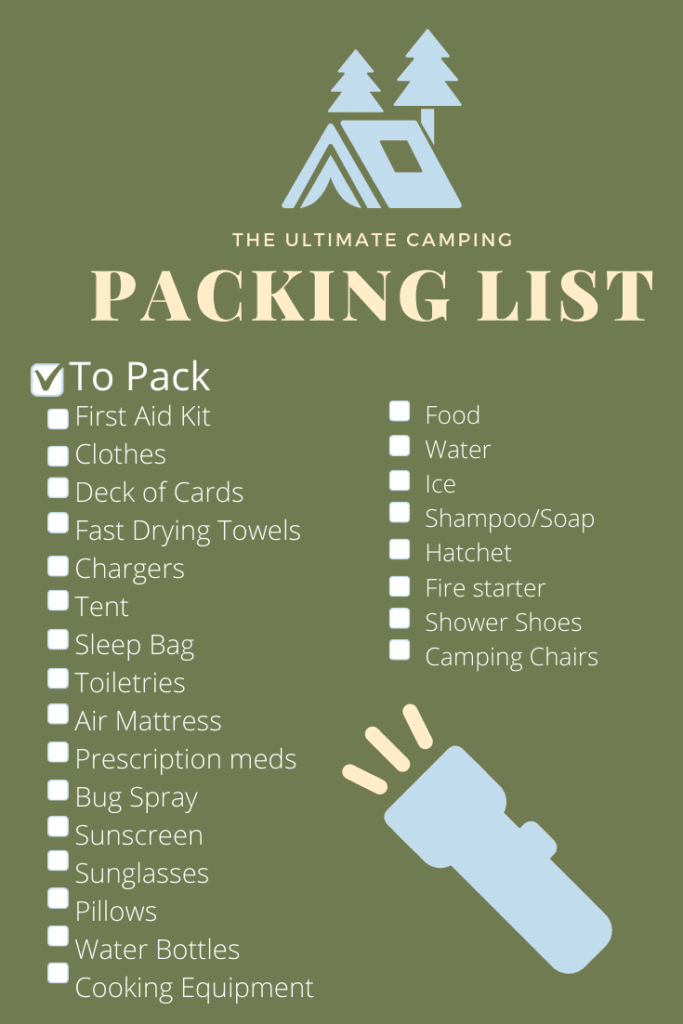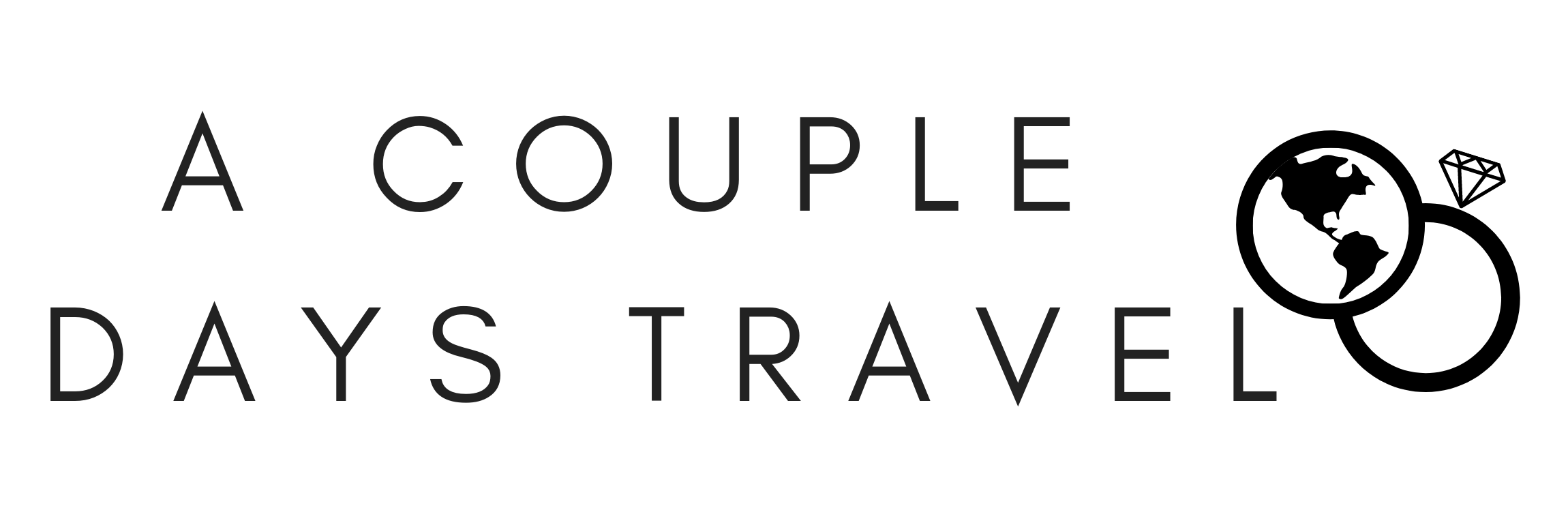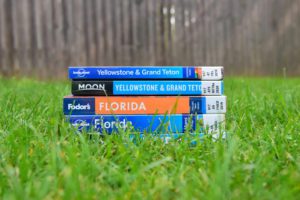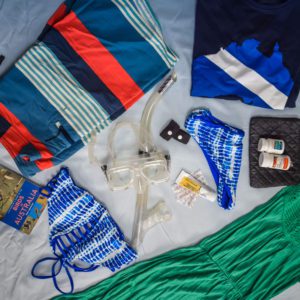Tent camping is a fun way to travel on a budget. And while many people may assume that tent camping is a “roughing it” experience, with a few camping essentials you can ensure that your campsite has everything you need to have a comfortable stay in any destination. When you start off camping, the most important thing is to make sure you are prepared for your stay in nature. So read through our camping essentials, make sure to plan ahead and enjoy your tent camping experience. And as the boy scout of our duo will tell you, Always be prepared!
Camping is a great option for traveling as it provides you with a ton of flexibility on where you stay each night. You can camp in private campgrounds, public parks, in the backcountry or in someone’s backyard (with their permission of course). This, in addition to cheap camp fees, allows you to spend more time and money on the experiences that matter most to you.
Another great advantage to camping is the amazing connection you can get to nature. You can cook your entire meal over a fire like your ancestors. You can smell pine needles AND morning coffee when you wake up. And you can feel dwarfed by a giant tree that is older than you. You can see a family of raccoons slowly wandering off into the woods with your bag of BBQ chips while giving zero F’s. All of this and more, makes camping an amazing experience. So have we convinced you? Continue reading to find out how to pack for your trip so you can fully enjoy it.
Camping EssentialsToggle Table of ContentToggle
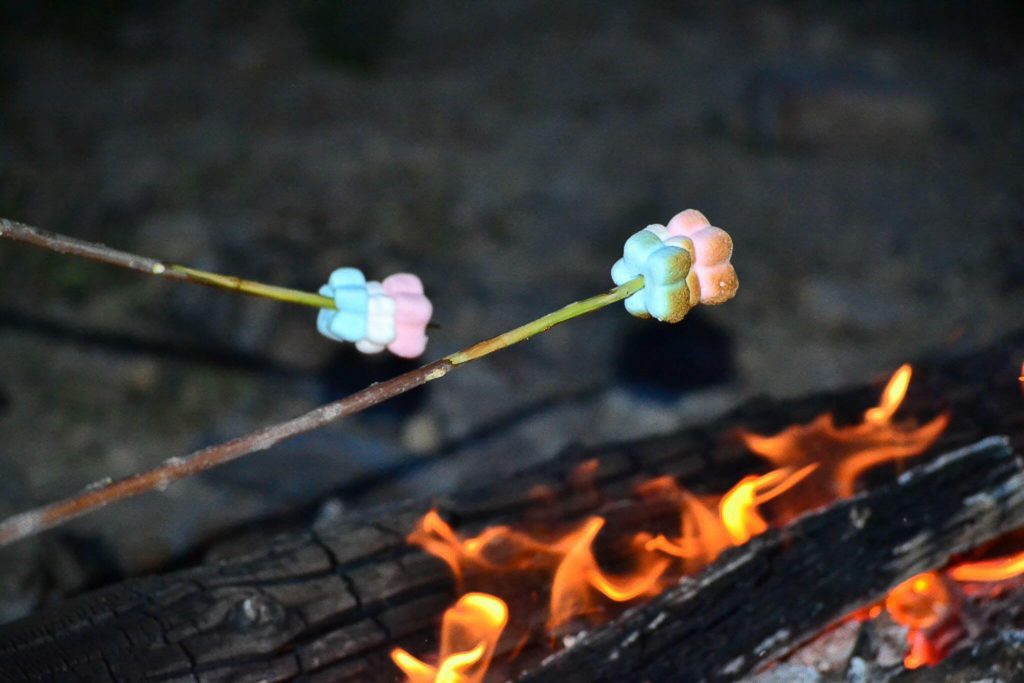
Campsite Amenities
Where you’re staying matters when you’re deciding what to pack for you camping trip. Most fee-based campsites will have a place to start a fire, a place to pitch a tent, a picnic table and some kind of toilets. Knowing which amenities your campsite has to offer is the first step in determining what camping essentials you need to pack. While backpacking or backcountry camping can be fun, these are not recommended for a beginner. We’ll be focused on car camping in our post.
Our camping checklist assumes you’ll have access to these amenities at your site. However, we’ve stayed in campsites where you had to bring your own toilet paper to the bathrooms. To avoid packing things you don’t need and forgetting things that you do, we recommend reserving your campsites in advance. Having an idea of where you’ll be staying allows you to better pack the camping essentials that will suit your trip.
Shelter
The single most important camping essential for your tent camping experience is your tent. You can rent a tent if you are a first time camper giving it a go. You can also buy some pretty inexpensive tents that can fit a whole family. Our 6 person tent cost us just over $100 dollars.
Do you think you’ll be doing a lot of camping in your future, particularly at sites where you’ll have to hike in and out? Then, we’d recommend splurging for an expensive hiking grade tent. These types of tents are often much smaller but are lighter and generally can withstand the elements. The fact that they’re more versatile makes them a great investment if you think you’ll take on more extreme camping trips.
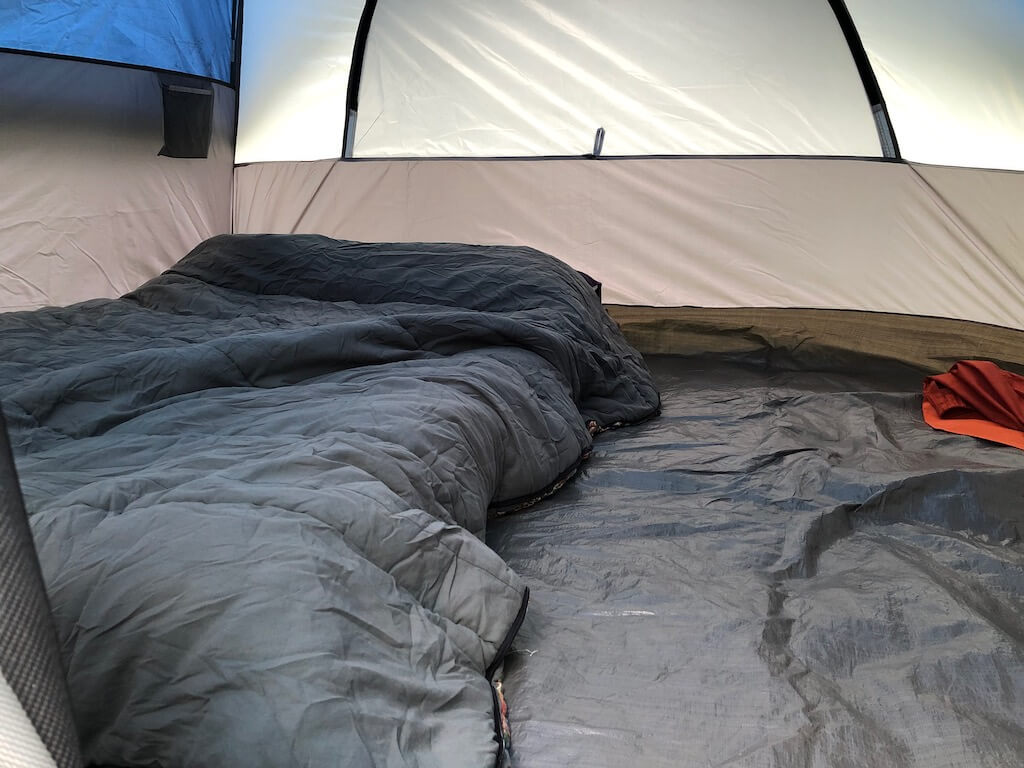
Camping Sleep System
For your sleeping arrangements, we recommend an air mattress – because getting old sucks. Our air mattress is a cheap one from our local superstore complete with battery powered air pump. An air mattress really is the height of luxury for any camping trip and is worth packing. If you plan on doing more hike-in camping, forgo the air mattress as it adds a lot of extra weight.
If you’re camping in cool weather, appropriate sleeping bags are a must. However, if you’re camping in warmer weather, consider using regular bedding instead. Regular bedding can take up less space in a suitcase than a sleeping bag. We personally like taking a fitted and flat sheet and then topping our bed with our one unfolded cold weather sleeping bags.
If you think you’ll continue with your camping adventures, a sleeping bag is another area that we recommend a splurge. A good (and pricy) sleeping bag is often rated for colder weather, takes up less space and weighs less than their less expensive counterparts. However, if camping will be a rare occasion for you, get a cheapy from your local big box store.
Make sure to pack some pillows. These are our most forgotten items and while you can sleep on a bunched up sweatshirt, a nice comfy pillow is better. And if you’re camping out of the trunk of your car it’s worth the extra space.

Food and Water
This is where knowing your campsite comes in handy! Are you’re camping in the desert and have minimal access to fresh water? Do you have a fire pit or grill to cook your own meals? Knowing these things ahead of time lets you determine what you need to pack and what you can leave behind.
In general, make sure you pack plenty of water bottles or hydration backpacks for your camping trip. You’re unlikely to have a fresh water source at your site so you’ll have to carry your water back from somewhere (normally a toilet/shower area).
You’ll also have to plan out the food you’ll bring. Make sure to take the time to plan your meals. This will help you to determine your camping essentials for the trip and avoid overpacking items that may go bad. Or, if you’re close to civilization you can plan on eating out.
Depending on what you need to pack for food, you may want to pack a cooler. Keep in mind the quality of your cooler and the location that you’re camping. If you’re camping in the desert far away from a store with ice, it may be worth investing in a high performance cooler to keep your food from going bad.
Camping Cookware
For cooking, you’ll need to bring fuel for your fire source, whether that be a charcoal grill or a wood fire pit. Be careful as most campsite don’t allow you to bring firewood into the campground due to pests. So you’ll have to make sure you have cash on hand to purchase wood onsite. You can also invest in a camp stove that will mimic the effect of a gas stove. However, we prefer the wild feel of cooking over the fire.
If you’ll be cooking over a wood fire, don’t forget to pack a hatchet or ax to split the wood or make kindling to start your fire. You may also want to bring a helpful fire starter tool like a propane torch if you aren’t confident in your fire starting abilities.
Some of our favorite cookware camping essentials are paper plates, plastic silverware, a camping tea/coffee pot, camping forks and a cast iron sandwich cooker. We’ve cooked meals for 9 days with just these items. However, you may want to pack more depending on what you plan on cooking.
Our favorite cookware is chosen because we never have to do the dishes. However, if you’d like to bring dishes that need to be washed, keep in mind you’ll have to bring equipment to wash your dishes. Washing dishes in campground sinks is often not permitted – and please don’t do it, it clogs the sinks. So you’ll need to bring a tub, dish soap and a pot for boiling water at a minimum.
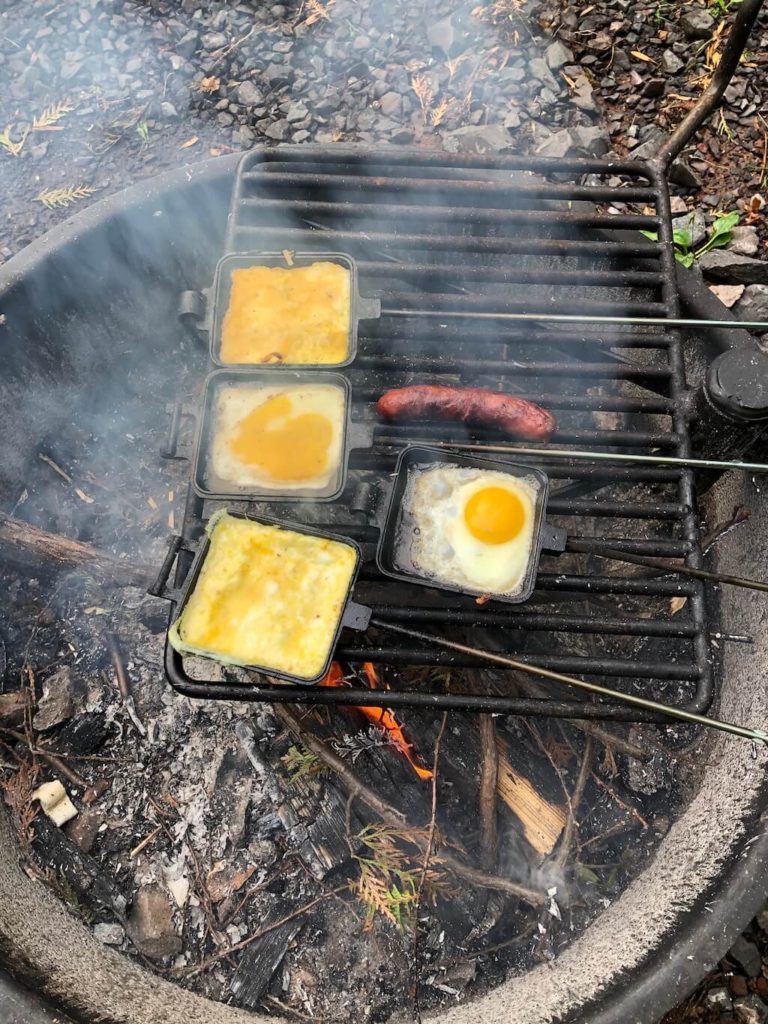
Clothing
You’ll want to pack in layers when it comes to clothing. We also like to pack light. We like packing lots of undershirts and underwear and only a few pairs of pants and over-shirts that we can wear multiple times. Also, if you’re staying in a site with a restroom area, make sure to pack some slip on shoes or flip flops for walking to the restroom at night.
In addition, you’ll want pack comfortable shoes and plenty of socks. We like wool socks that go above the ankle as they’ll keep you warm, dry and keep the bugs off of you. You can even buy wool socks for warm weather.
Checking the weather ahead of time is important for packing your clothes. However, never leave home without your rain jacket and at least one warm jacket. These camping essentials take up very little space and will ensure that you stay comfortable no matter what the weather brings.
Toiletries
To keep yourself smelling fresh, don’t forget deodorant and other hygiene products as well as some wet wipes for an impromptu car shower. For the primpers of the world, pack very little makeup or hair product for camping as there often isn’t a space to do morning primping so opt to save space.
Keep in mind the bathroom situation and note if you’ll need your own toilet paper. Those napkins you keep in your glove box will do in a pinch but packing a roll of toilet paper would be better.
Remember you’ll also be showering at the campsites so don’t forget to pack your own toiletries, shower shoes and towels. We recently discovered fast drying towels and they are a must for any camping adventure. You’ll also want to bring some kind of bungee cord to make a clothesline for your towels and any wet clothes.
Other Camping Essentials
Waking up to pee in the night is a real thing for the over 25s and doing it in a strange place can be disorienting. We love individual headlamps. You can put on the headlamp to explore the camp restrooms at night and you can even forgo the use of a camping lantern if everyone has one. Whatever lighting option you choose, we recommend getting rechargeable LED flashlights, headlamps or lanterns as this eliminates the need to pack batteries or fuel. However, if your light source isn’t rechargeable, make sure to pack extra batteries or fuel.
Also, you’ll want to pack all of the general camping essentials like a first aid kit, sunscreen, bug spray and a camping knife. For bug spray, we recommend bringing one that contains deet. Even if a more natural spray works for you most of the time, camping would be a really crappy time to find out that your natural spray doesn’t work on these all bugs.
Make sure to pack at least one camping chair for each person if you’re traveling by car. While many sites have picnic tables, camping chairs are preferred for their back support.
On the off chance that rain ruins some of your travel plans, make sure to pack some small games or a deck of cards to pass the time.
We hope our camping essentials list has helped you to be better prepared for camping. Camping can be such a pleasurable a cheap way to travel if it is done right. So don’t forget to plan ahead and double check your list! Now get out there and enjoy nature.
Print out our checklist or save it to Pinterest today!
